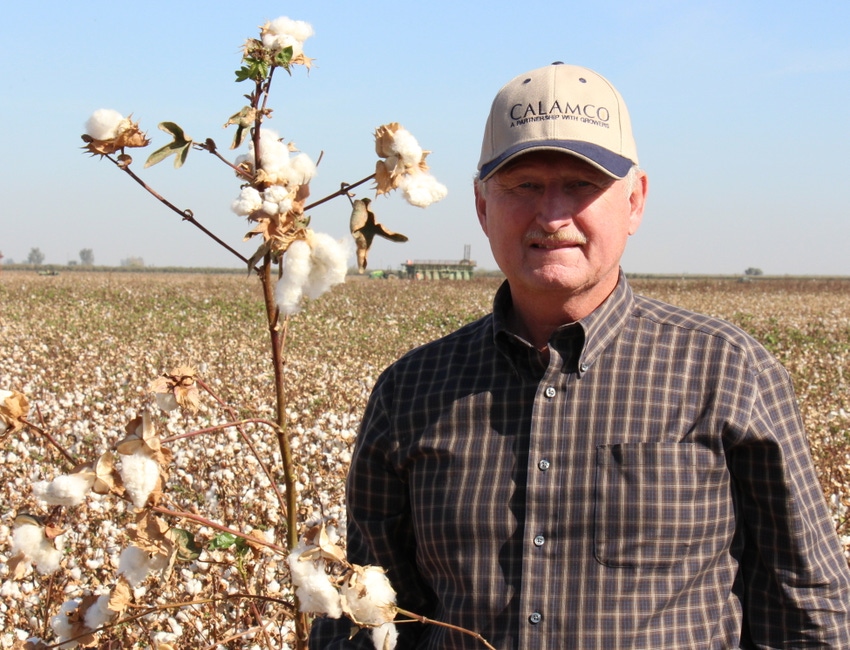
Third-generation California cotton grower Mark McKean cares deeply about his farm. He has great respect for the land, the environment, and water conservation — a devotion that has earned his family the Farm Press/Cotton Foundation High Cotton Award for 2017.
Mark and his wife, Megan, and their sons, Wyatt and Connor, operate McKean Farms at Riverdale, a diversified operation located in Fresno County in California’s famed San Joaquin Valley, considered by many in the West as the best quality farmland in the world.
The McKean farm is 3,700 acres, including Pima cotton (540 acres last year), almonds, wine grapes, processing tomatoes, and alfalfa.
On learning about the family’s High Cotton award, McKean responded, “It’s a true honor to receive this honor. I’ve known many people who have received it, and they are the icons of the industry who I respect in many different ways.”
The McKean family typically grows Pima and Upland Acala cotton annually. Yet due to planting cotton on heavier soils last year, they went with 100 percent Pima. Cotton is usually planted by April 15, with harvest starting in mid-October.
Mark is a progressive grower unafraid to tell it like it is. He enjoys growing cotton, but understands that every crop has its challenges. “If you are a cotton farmer and you don’t enjoy it, you probably shouldn’t be growing it,” he says. “It’s not easy because of the many steps during the growing cycle.”
The fall months are McKean’s most rewarding time of the year. “For me, cotton is really rewarding at harvest time. You travel across a nice field and see the fruits of your labor. It’s a rewarding day when you end up with a really good crop of cotton.”
BULLS AND COTTON
Mark has farmed for 29 years and experienced many economic cycles, both prosperous and lean. With cotton prices in the doldrums the last several years, he was glad to see lint prices gain traction last fall. Unfortunately, though, prices always shift up and down. About five years ago fiber prices rose to unparalleled levels, only to fall again. Recently, they’ve been heading slightly higher — hopefully a good omen.
“I am slightly bullish on the cotton industry, given some positive import and export numbers,” McKean says. “If California doesn’t have significant water issues (drought) in 2017, I believe cotton acreage will increase for Upland and Pima.”
He calls Pima an “interesting animal” from a price standpoint. “When Pima buyers are in town, you’d better be ready to be a seller because they aren’t always in town. The Pima market is not as much of a liquid market compared to Upland.”
The McKeans hope to increase their 2017 cotton acreage by 25 percent to 30 percent or more in 2017.
IMPROVED VARIETIES
Mark’s intention to grow more cotton is based largely on the solid performance of newer varieties on the market. He has grown Dow AgroSciences PhytoGen PHY 801 RF, PHY 802 RF, PHY 841 RF, and PHY 881 RF (all Pima), plus Monsanto’s Deltapine DP 448 B Upland Acala, all with good results.
“PhytoGen PHY 881 RF looks extremely good to me — both on paper and in our field,” he says. “The Deltapine varieties also look very good. I think these varieties will fit our cotton needs in
Cotton yields tend to average 3 bales to 3¼ bales of fiber per acre. The cotton is ginned at the West Island Cotton Growers, Inc., gin at Riverdale, and marketed by the Bruce Albright Agency at Fresno.
“Mark grows excellent quality cotton, which is in the top 10 percent to 15 percent grade-wise,” says gin manager Tom Pires. While Mark would like to achieve higher yields, the area’s high alkaline soils limit production, tied in part to salt buildup from five consecutive years of drought.
Most of the irrigation water is “lousy” quality groundwater due to salt, he says. Well water is pulled from a depth of 220 feet to 240 feet. Higher quality surface water is in limited supply due to the ongoing drought, but when it’s available it’s used. “Fresh surface water during the middle of the growing season is a real plus,” he says.
Son Connor adds: “When we get fresh water, you can see the positive difference in plants within 10 days to 20 days after applying the surface water. The plants lift up and just look happier and healthier.”
ENVIRONMENTAL STEWARDSHIP
The McKean family places great emphasis on environmental stewardship, using inputs sparingly. This has been achieved for nearly a decade, in part by using variable rate input applications of nitrogen and Pix. Reduced N use has helped protect the groundwater.
“We once had crop uniformity issues at defoliation time, and we’ve counteracted much of it with variable rate Pix applications,” Mark says. “It’s really helped at picking time. The benefits include better defoliation and a more uniform crop at picking.”
The McKean family’s pro- environment philosophy also includes the sparing use of crop protection materials. “Spraying a chemical is the last thing I want to do,” Mark says. “Anytime you start applying a chemical, you are in a cycle of doing it again and again. The longer you can put it off, the better.”
He’s sprayed his cotton just one or twice per season in recent years. Major pests include mites and lygus, and to a lesser degree, whiteflies and aphids. The region typically has whitefly-caused stickiness concerns about every five years.
McKean is an advocate for natural predators, monitored closely in the field. Last year, a solid influx of lacewings successfully managed an aphid outbreak. “The lacewings held the aphids at bay long enough to reduce the problem so we didn’t have to spray,” he says. “Ladybugs early, lacewings later, and assassin bugs — they do a good job for us.”
The pest control advisor at McKean Farms is Andy Gulley of Simplot, who praises the family’s solid approach to pest management. “The McKeans are the whole package. They do the right things on the farm, are conscientious, and act in good faith.”
Gulley says, “Mark takes an integrated approach to growing cotton by using the best tools available, including softer chemistries, to protect beneficial insects.” McKean also considers UC-based pest economic threshold recommendations in his decision-making.
WATER: 800-POUND GORILLA
Water remains the 800-pound gorilla in California agriculture. McKean and other farmers could write volumes on water use controversies — including the use of large quantities of water in an attempt to protect the Delta smelt fish (water not available for agriculture); plus use of an increasing amount of the state’s limited water supply to support the state’s growing urban population, which translates into less water for food and fiber production.
On the research side, the McKean farm participates in University of California Cooperative agricultural research trials with cotton specialists Dan Munk and Bob Hutmacher. “Mark has demonstrated leadership by supporting UC work in the areas of irrigation management, variety development, tillage, and soil building,” Munk says.
“He has provided testimony at public hearings by the Regional Water Quality Control Board about essential farming methods, including environmentally sound nitrogen management practices used to produce high-yielding crops, including cotton.”
Off the farm, McKean’s leadership positions have included about half a dozen water associations. He is the past chairman and current board member of the California Cotton Growers Association (CCCA).
“Mark is well respected in the California cotton industry,” says Roger Isom, CCCA’s president and CEO. He calls McKean one of the most proactive growers in California — both on the agronomic side of his farm, and in dealing with regulatory and legislative issues.
Isom says, “He doesn’t just sit back — he gets involved. Mark is a great spokesperson and representative for not only cotton growers, but all growers in California.”
Mark and Megan have also dedicated time to guiding local youth to become successful leaders.
All four McKeans graduated from Cal Poly Obispo, San Luis Obispo. Wyatt and Connor worked off the family farm after college, and decided to come back. Both young men are smart, intelligent, and progressive — just like their parents. Megan says, “Like Mark, I am very blessed the boys came back to the business.”
The brothers remain positive about agriculture’s future, yet recognize the many challenges ahead, including environmental regulations, labor availability and affordability, and the growing disconnect between urban and rural populations.
About the Author(s)
You May Also Like






